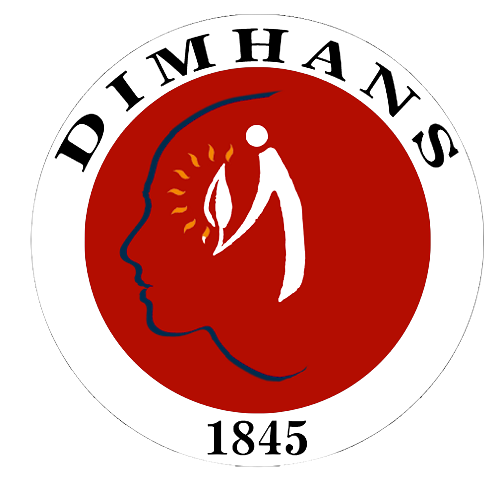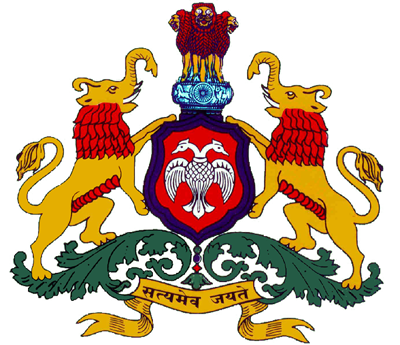The Department of Psychiatry is functioning since the time hospital was established. As we know the hospital was catering exclusively to the needs of mentally ill patients. To its credit, the department has trained 17 DPM students from 1980-to 1989. Formally department came into existence following the conversion of KIMH into DIMHANS and after teaching staff joined the institute. To develop as an excellent training post-graduate training center in Psychiatry. Referral center for Psychiatry in north Karnataka train, co-ordinate, and strengthen the training of health workers and medical officers at various levels of community health services. Active participation in DMHPG of the state. Development of community-level mental health programs for children and women. Development and strengthening of state-level policies for mental health in Karnataka develop super specialty program in Forensic Psychiatry. Presently department offers clinical services to nearly 300-400 patients per day on an outpatient and In-patient basis. Department has 60 teaching beds and 315 clinical service beds. It has separate forensic wards for males and females with bed strength of 60:60 respectively for patients admitted with reception order. Special beds are available for affordable patients. A separate de-addiction ward is for substance use disorders. On an outpatient basis, the department runs special clinics for children and adolescents, the Geriatric population, epilepsy, mental retardation.The department is actively involved in clinical work, teaching, and research activities. The usual working hours of the department are 9:00 a.m. to 4:00 p.m. from Monday to Saturday with a one-hour lunch break from 1 p.m. to 2 p.m. Facilities available include comprehensive inpatient treatment [4,263 patients (3,525 male and 738 female) were admitted in the year 2019]. Indoor services include treatment of patient's physical and mental health. Regular assessment of patients’ conditions is done by an efficient interdisciplinary team of psychiatrists, psychologists, psychiatric social workers, and nursing personnel trained to cater to mentally ill patients. Pharmacological management of the patient is done with modern treatment methods using newer antipsychotics, antidepressants, mood stabilizers, and, anti-epileptic drugs. A facility for modified electroconvulsive therapy is available both on an inpatient and outpatient basis. Pertinent psychological tests and interventions are used as part of the biopsychosocial approach to inpatient care. Blood and other investigations are done free of cost for admitted patients. Case records are maintained and preserved for patients’ detailed information which is available on the central server of the Institute. The Junior Residents undertake the detailed history and examination of admitted patients and the case is discussed with the Senior Resident during evening rounds daily. During ward rounds, the management plan for treatment is discussed with consultants. Instructions for nursing staff, including the medicines prescribed, are put down in writing in Instruction Book. This is kept with the staff nurse on duty.
The patient once admitted comes under the total care of the Junior Resident to whom the allotment of the case is made. He/she is responsible for the management and care of the patient under the supervision of the senior Resident and Consultant. The department has outpatient services for mentally ill persons from Monday to Saturday from 9:00 a.m. to 4 p.m. (except on holidays). Special clinics are run on specific days to cater to the specific needs of particular illnesses. Academic activities include regular management and academic rounds, teaching programs, lectures, and ward case discussions. The department is also involved in imparting training of professionals and non-professionals in the field of Mental Health (awareness to research level), services to both community-oriented and community-centered services, and developing health education materials for both professionals and non-professionals in the field of Mental Health. The training programs are carried out at the Unit level, Department level, and also interdepartmental level. Training is not only imparted to post-graduate trainees of other departments of the Institute but also trainees from other medical colleges and institutes. The Department of Psychiatry is a specialized branch of medicine that focuses on the diagnosis, treatment, and prevention of mental, emotional, and behavioral disorders. It is a crucial field of healthcare that addresses the complex interplay between biological, psychological, and social factors that contribute to mental health.The primary goal of the Department of Psychiatry is to promote mental well-being, provide comprehensive psychiatric care, and support individuals in achieving optimal mental health. The department typically consists of a multidisciplinary team of professionals, including psychiatrists, psychologists, psychiatric nurses, social workers, and other mental health specialists.
Services Offered:
Evaluation and Diagnosis: The department provides comprehensive evaluations to assess mental health conditions and make accurate diagnoses. This involves conducting interviews, psychological assessments, and reviewing medical history to develop an individualized treatment plan.
Medication Management: Psychiatrists specialize in prescribing and managing psychiatric medications. They work closely with patients to monitor the effectiveness of medications, adjust dosages, and address any side effects.
Psychotherapy: The department offers various forms of psychotherapy or talk therapy, including cognitive-behavioral therapy (CBT), dialectical behavior therapy (DBT), interpersonal therapy (IPT), and psychodynamic therapy. These therapies aim to help individuals understand and manage their emotions, thoughts, and behaviors, leading to improved mental well-being.
Crisis Intervention: The department provides immediate support and intervention for individuals experiencing mental health crises. This may involve emergency assessments, referrals to appropriate services, and coordination with other healthcare providers.
Collaborative Care: Psychiatry departments often collaborate with other medical specialties, such as primary care, neurology, and geriatrics, to ensure holistic care for patients with complex medical conditions.
Research and Education: Apart from clinical services, the Department of Psychiatry is actively involved in research and education. Psychiatry departments often engage in research studies to advance the understanding of mental health disorders, develop innovative treatment approaches, and improve patient outcomes. They may also participate in clinical trials to evaluate new medications and therapies. Additionally, psychiatry departments are responsible for training and educating future mental health professionals. They may offer residency programs for psychiatrists, psychology internships, and fellowships in specialized areas of psychiatry.
Community Outreach and Advocacy: Psychiatry department play a vital role in community outreach and mental health advocacy. They conduct educational programs, workshops, and awareness campaigns to promote mental health literacy, reduce stigma surrounding mental illness, and encourage early intervention. These initiatives aim to improve access to mental health services and support the overall well-being of the community.
The days of various units in Psychiatry and list of special clinics at the Institute are as follows:
|
Sr No
|
Department/Clinic
|
Unit Name/Clinic In-Charge
|
Days
|
|
1
|
Psychiatry
|
Unit A
|
Monday & Thursday
|
|
2
|
Psychiatry
|
Unit B
|
Tuesday & Friday
|
|
3
|
Psychiatry
|
Unit C
|
Wednesday & Saturday
|
|
4
|
De-Addiction Clinic
|
Dr.Mahesh Mahadevaiah
|
Monday to Saturday
|
|
5
|
Child Psychiatry
|
Dr.Raghavendra Nayak & Dr.Tejaswi TP
|
Monday to Saturday
|

















